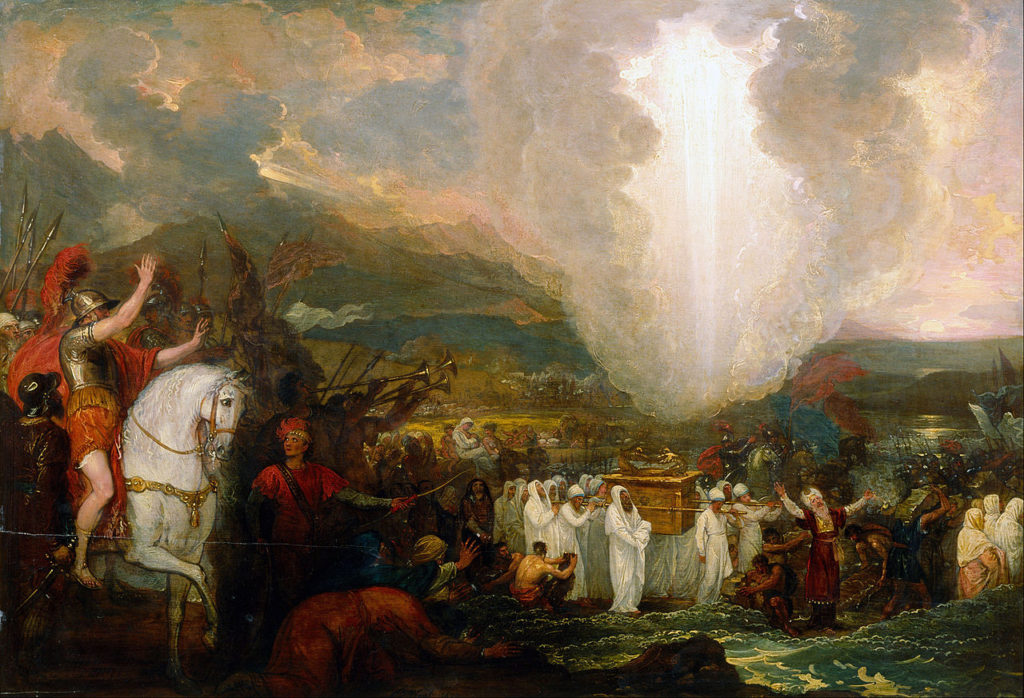[Greek] νέφος (nephos), [Latin] nebula: cloud, dense multitude, mist, particles; Heb.12:1

Joshua passing the Jordan River with the Ark of the Covenant: painting by Benjamin West (1800). The Lord went ahead of them in a pillar of cloud by day and in a pillar of fire by night.
Background information:
Greek Hellenism: This term, meaning cloud, can be used to represent clouds, deities, loftiness, and metaphorical traits. Clouds can metaphorically represent mourning, men, lament, blindness, and unbelief. Clouds also manifest the attributes of the deities. The cloud is the chariot of the gods which leads the heroes to them. The deities (and their assistants) conceal themselves in the clouds. Orphism often places the clouds at the service of the supreme deity. Aristophanes, in his play Clouds, presents the clouds as the new gods of sophistry (fallacious arguments and deceptions). Aristophanes’ Clouds 348 states “These clouds become all things whatever they please. If they should see Simon, a plunderer of property, they suddenly become wolves, showing up according to his disposition.” Aristophanes’ Birds 818 states “Well then, what name can you suggest? Some name borrowed from the clouds, from those lofty regions which we dwell, in short, some well-known name.” Aristophanes’ Peace 1090 states “This grand oracle of Homer’s: Thus vanished the dark war clouds and we offered a sacrifice to new born Peace.” Sophocles’ Oedipus Tyrannus 1314 states “O horror of darkness that enfolds me, unspeakable visitant, restless, sped by a wind too favorable.”
Old Testament: God, rather than mythology (gods), is associated with clouds. Clouds are found in theophanies, rapture stories, Covenant stories, and creation. Theophanies, visible manifestations of God’s glory, appear in nature and accompany the Israelites on their journey. Although not explicitly stated, clouds are involved in the rapture stories of Enoch and Elijah. Clouds (and storms) accompany and protect the Israelites on their journeys. God illustrates His command of nature through weather phenomena. He made darkness the cover about Him, his canopy, heavy thunderheads (Psa.18:11). Silence, all mankind, in the presence of the Lord! For He stirs forth from His holy dwelling (Zech.2:17). I saw One like a Son of Man coming, on the clouds of heaven (Dan.7:13). The Lord opened the eyes of the servant, so that he saw the mountainside filled with houses and fiery chariots around Elisha (2Kgs.6:17). The Lord preceded them, in the daytime by means of a column of cloud to show them the way (Exo.13:21). I will command the clouds not to send rain upon it (Isa.5:6).
New Testament: This term metaphorically makes reference to a large cloud of witnesses (saints). These witnesses are faithful Old Testament and New Testament people of faith. By focusing on Jesus, we can persevere on running the Christian race (life) that lies before us. We must rid ourselves of every burden and sin which may distract us. These witnesses act as intercessors who seek to help us on this journey. The saints, alive in heaven, can hear our prayers and intentions.
Scripture:
“Therefore, since we are surrounded by so great a cloud of witnesses, let us rid ourselves of every burn and sin that clings to us and persevere in the running the race that lies before us.” Heb.12:1
The witnesses are the saints in heaven who watch and pray for us on our journey in life. We must show discipline like an athlete in avoiding sin. We are all running that Christian race (life).
Saints:
How is it possible that the saints (in heaven) can hear our prayers? The saints in heaven are more alive than we are with God. These saints, free from all sin, share and enjoy the fullness of God’s life giving presence. Flooded with God’s love, these saints greatly care about us.
Isn’t praying to the saints a violation of Jesus being the one and only mediator? No. This is no different than asking someone else to pray for you. This does not contradict Jesus’ role as mediator. We all share in a lesser and dependent mediation.
How can the saints hear all our prayers? Heaven has no space or time as we understand it. Everything appears to God as one eternal present (now). These saints, close to God, are able to hear all our prayers.
Conclusion:
Nebula, nebulous
It was interesting to discover how this term is presented in metaphorical terms. It is noteworthy that clouds contain the gods and their assistants. The chariot, symbolizing the heroic qualities of the gods, is bestowed upon a fallen mortal man who is led to the gods. The Greek playwrights quite often wrote about the human condition, even criticizing or mocking customs. Aristophanes presented the clouds as lofty wise guys.
In the Old Testament, clouds (and related phenomena) illustrate the power of God in salvation history and in creation. It is also interesting that chariots are found in the rapture stories of Enoch and Elisha.
In the New Testament, clouds are metaphorically presented as a large group of witnesses (saints). These witnesses are constantly interested and concerned about our welfare. These saints, close to God, are more alive than we could possibly comprehend. It is also interesting to note that Paul was influenced by Hellenistic philosophy.
It is significant to note that both the Old Testament and New Testament oftentimes borrow ideas from past eras to convey important religious and theological truths.
For those of you who may face storm clouds (or even have a cloud hanging over you), or if your path is cloudy (nebulous) you can always call upon the cloud of witnesses (saints) to brighten your day!
